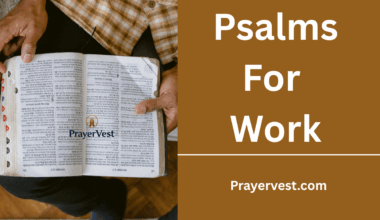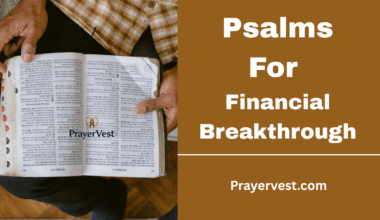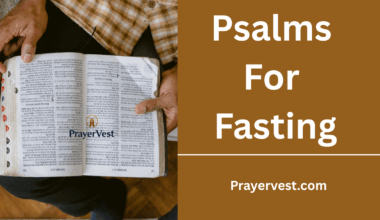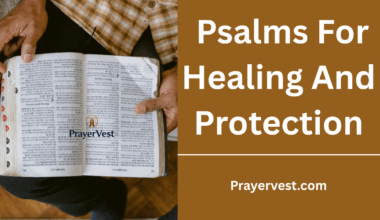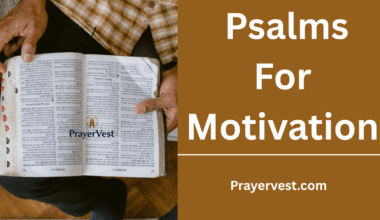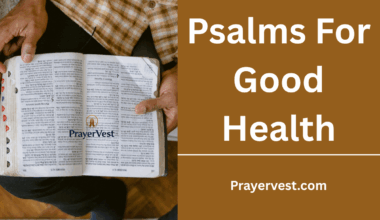Every human life is impacted by suffering, whether it manifests as relational heartbreak, bodily pain, mental distress, or spiritual adversity. The Book of Psalms provides a spiritual language for the wounded soul at those times when words cannot express what is needed and hope seems far away.
Our suffering is not only acknowledged by these holy melodies; it is also echoed, validated, and given a place before God. The Psalms for suffering demonstrate that suffering is an opportunity to grow closer to the One who hears even the screams we are unable to express, not an indication of divine desertion.
The Psalms offer profound consolation because they maintain the tension between suffering and trust, in contrast to superficial solutions or meaningless platitudes. They embrace God’s goodness and sovereignty while making room for open lament, unvarnished questioning, and even annoyance with Him.
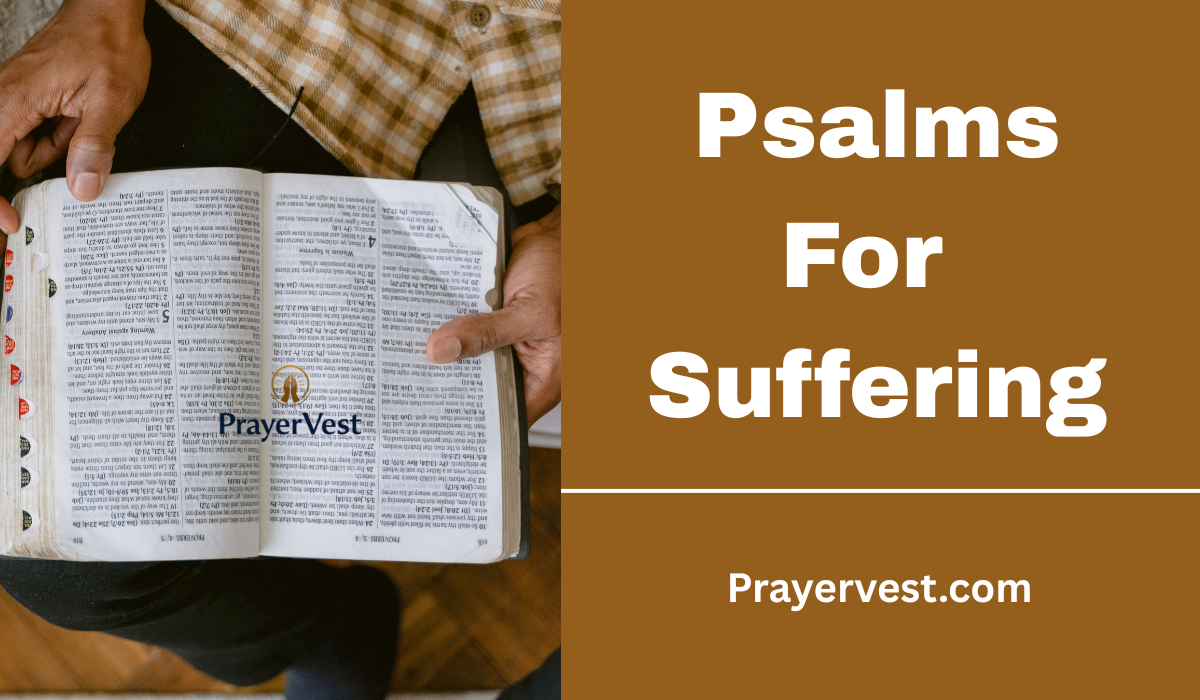

Psalmists like David, Asaph, and others set an example for loyal suffering by bringing one’s suffering to God directly rather than feigning it doesn’t exist. These verses teach us that God is close to the brokenhearted; therefore, it’s acceptable to cry, struggle, and wait.
You’ll find passages that directly address your suffering and provide hope in the midst of it in this compilation of 50 potent Psalms for suffering. Let these verses serve as your prayer, your solace, and your direction whether you are dealing with illness, bereavement, betrayal, or extreme discouragement. Through them, may you discover that God’s love is unwavering, His presence is constant, and His promises are your lifeline—even in the valley of sorrow.
50 Most Uplifting Psalms For Suffering (2026)
1. Psalm 34:19
“The righteous person may have many troubles, but the Lord delivers him from them all.”
This verse acknowledges a crucial truth—righteous people are not immune to suffering. Their walk with God often draws them into trials. Yet the power of this verse lies in its promise: deliverance is sure. God doesn’t overlook suffering; He steps into it and leads His people through it. The verse doesn’t promise the absence of trouble, but it does guarantee divine presence and ultimate rescue.
Reflection
Suffering is not a sign of God’s absence but often a stage for His most profound work. The world may expect ease and comfort as a reward for goodness, but Scripture reveals a deeper narrative: God walks with the righteous through every valley. He sees every tear, feels every groan, and responds with timely deliverance. When trials mount, hold onto this promise—not as wishful thinking, but as the certainty that no pain is wasted, and no suffering is unnoticed by the God who delivers.
2. Psalm 147:3
“He heals the brokenhearted and binds up their wounds.”
This verse paints a picture of God as a gentle healer—one who does not avoid brokenness but leans into it. The Hebrew image here is that of a physician tenderly dressing wounds, signaling deep care and intentional healing. God is not indifferent to our pain; He tends to it with hands of mercy and a heart full of compassion.
Reflection
When you are suffering, especially emotionally or physically, it’s easy to feel discarded or unseen. But God steps in as a healer—not hurriedly or harshly, but with the attentiveness of One who values every part of you. The world may try to numb your pain or rush you through it, but God binds your wounds and sits with you in your heartbreak. His presence is not a quick fix; it is a faithful remedy that comforts and restores over time.
3. Psalm 22:1
“My God, my God, why have you forsaken me?”
These haunting words, cried by David and later echoed by Jesus on the cross, capture the depth of despair and suffering. They give voice to the feeling of divine silence or absence during intense trials. But even in his anguish, David calls God “my God”—a profound act of faith amid despair. This verse shows us that it’s okay to cry out honestly to God in our suffering.
Reflection
Suffering can lead us to feel abandoned, even by God. But this verse shows that expressing our raw emotions does not push God away—it brings us closer to Him. God is not offended by our honesty; He invites it. David’s lament is a model of wrestling with pain while holding on to faith. Even Jesus felt the weight of divine silence. So when you feel forsaken, remember: you’re not alone, and even your cries are heard by the One who understands.
4. Psalm 6:2-3
“Have mercy on me, Lord, for I am faint; heal me, Lord, for my bones are in agony. My soul is in deep anguish. How long, Lord, how long?”
This psalm shows the deep connection between physical pain and emotional anguish. David cries out for mercy amid total exhaustion—physically weak, emotionally overwhelmed, spiritually desperate. His honest plea reflects the groaning of a soul crushed by suffering, yet it also shows that the proper response is to turn to the Lord in prayer.
Reflection
Pain can leave us breathless, weary, and worn out. Yet in our faintest moments, we can still cry out to God, just as David did. His question—“How long?”—is not a challenge to God’s authority, but a cry of trust that God is listening. When suffering lingers and healing seems far, we learn to wait not in despair but in prayer. God hears our anguish, and His mercy is never out of reach, even when relief delays.
5. Psalm 9:9
“The Lord is a refuge for the oppressed, a stronghold in times of trouble.”
This verse provides assurance that God is not distant during suffering. He is described as a refuge and stronghold—places of safety, shelter, and stability. For those feeling crushed by life’s burdens, God offers Himself as a secure place to run to. He does not merely sympathize with the oppressed; He shelters them.
Reflection
When the storms of suffering rage, we need a place to hide—not to escape life but to find strength to endure it. God is that place. He doesn’t eliminate every trouble instantly, but He offers a stronghold that cannot be shaken. When people fail us or circumstances collapse, God stands firm. Trusting Him as your refuge means you are never left defenseless, even in your weakest hour.
6. Psalm 42:11
“Why, my soul, are you downcast? Why so disturbed within me? Put your hope in God, for I will yet praise him, my Savior and my God.”
This verse captures the internal dialogue of someone struggling with despair. The psalmist acknowledges his emotional turmoil but doesn’t stop there—he challenges his soul to hope. This verse reminds us that we can speak truth into our suffering by reorienting our hope toward God.
Reflection
Suffering often begins in the soul before it reaches the body. When discouragement clouds your heart, speak to your soul like the psalmist did. Remind yourself of God’s promises. Praise becomes a weapon against despair. Even when your feelings resist, you can choose to hope, to worship, and to wait on God’s faithfulness. Your soul may be downcast now, but it will rise again in praise.
7. Psalm 38:9
“All my longings lie open before you, Lord; my sighing is not hidden from you.”
This verse reveals the intimacy of God’s awareness. Every longing, every sigh, every unspoken groan—God sees it all. In suffering, we often feel misunderstood or unseen. But this verse assures us that God knows the inner cry of our hearts, even when we cannot put our pain into words.
Reflection
You don’t have to articulate your suffering perfectly for God to understand. He hears the sighs you release in the quiet, sees the tears that fall in the dark, and knows the aches you can’t explain. Your unspoken pain is still heard in heaven. Rest in the truth that your vulnerability is safe with God—He holds your longings with tenderness and responds with compassion.
8. Psalm 55:22
“Cast your cares on the Lord and he will sustain you; he will never let the righteous be shaken.”
This verse gives a direct invitation: don’t carry your burdens alone—give them to God. The promise isn’t that burdens will disappear immediately, but that God will sustain you through them. He will uphold you and make sure you’re not destroyed by what you’re going through.
Reflection
The weight of suffering can feel unbearable, but you were never meant to carry it on your own. God’s sustaining grace is not just a temporary lift—it’s daily support. When you cast your burdens on Him, you are entrusting your weakness to His strength. He promises that you will not be shaken—not because you are strong, but because He holds you steady.
9. Psalm 61:2
“From the ends of the earth I call to you, I call as my heart grows faint; lead me to the rock that is higher than I.”
This heartfelt plea shows someone overwhelmed and distant, emotionally or spiritually. In his faintness, the psalmist calls out not just for relief but for higher ground—something stronger, greater, more stable than himself. This “rock” represents God’s strength and elevation above our circumstances.
Reflection
There are moments in suffering when you feel like you’re at the end of yourself—mentally exhausted, emotionally drained, spiritually disconnected. But in those moments, you can still cry out to God. Ask Him to lift you to higher ground, to place your feet on something that won’t shift beneath you. God is that rock, unmovable and faithful, even when your heart is failing.
10. Psalm 119:50
“My comfort in my suffering is this: Your promise preserves my life.”
This verse emphasizes the power of God’s Word during times of suffering. The psalmist finds comfort not in changed circumstances but in the enduring truth of God’s promises. Scripture becomes life-preserving, soul-sustaining balm in seasons of distress.
Reflection
God’s promises are not abstract truths—they are lifelines. When pain threatens to unravel you, cling to what He has spoken. His Word does more than encourage; it preserves. The truths found in Scripture anchor you in the storm and breathe life when everything else feels like death. Let His promises speak louder than your pain, and you will find unexpected comfort even in the suffering.
11. Psalm 6:2
“Have mercy on me, Lord, for I am faint; heal me, Lord, for my bones are in agony.”
This verse is an earnest cry for both mercy and healing. The psalmist is physically and emotionally spent, his suffering reaching into the depths of his body. It reminds us that God is concerned not just with our spiritual well-being but also with our physical pain. He is the healer of both body and soul.
Reflection
When your pain feels unrelenting, you can cry out to God with honesty and desperation. He does not dismiss physical agony as lesser suffering—He acknowledges it and invites you to bring it before Him. Whether the pain is emotional, mental, or in your bones, God’s mercy can reach it. His healing touch isn’t just for restoration but for renewal from the inside out.
12. Psalm 30:5
“Weeping may stay for the night, but rejoicing comes in the morning.”
This verse speaks to the temporary nature of suffering and the certainty of God’s restorative joy. Nights of weeping are real, but they are not forever. God promises that joy will follow sorrow, not because time passes, but because He brings the morning.
Reflection
Your suffering may feel like a long, unending night, but morning is coming. God is not just present in the night—He brings the dawn. Hold on through the darkness, for His joy is rising on the horizon. Every tear you cry is noticed, and every night you endure moves you closer to His light. Trust the God of the morning to restore your soul.
13. Psalm 34:18
“The Lord is close to the brokenhearted and saves those who are crushed in spirit.”
This verse assures us that suffering does not create distance from God—it draws Him near. When your heart is shattered, God moves closer. He doesn’t wait for you to fix yourself; He comes to save you in your brokenness.
Reflection
There is no suffering too deep for God’s compassion. If your spirit feels crushed under the weight of grief or disappointment, you are exactly where God’s presence abounds. He doesn’t avoid your pain—He enters into it with you. In your lowest, most broken state, He comes near, not to scold, but to save. You are never alone in your suffering.
14. Psalm 102:1-2
“Hear my prayer, Lord; let my cry for help come to you. Do not hide your face from me when I am in distress.”
This heartfelt plea captures the urgency of suffering. The psalmist is desperate to be heard by God, longing for a response amid distress. It teaches us that we can boldly approach God with raw emotions, knowing He does not turn away from us in pain.
Reflection
In your distress, it’s okay to plead with God—to ask Him not to hide, not to be silent. Prayer is not about polished words but honest need. God welcomes your cries, your frustration, your questions. He is not offended by your pain; He is moved by it. Let your suffering drive you to His presence, for that is where help is found.
15. Psalm 143:7
“Answer me quickly, Lord; my spirit fails. Do not hide your face from me or I will be like those who go down to the pit.”
This verse expresses the desperation that comes when suffering seems to silence God. The psalmist is pleading for a quick answer because his strength is almost gone. He knows that without God’s presence, the darkness will swallow him.
Reflection
Have you ever felt like your spirit was about to break? This verse gives voice to that despair. But even in that moment, the psalmist prays—he doesn’t give up. When your faith is flickering, call out anyway. God hears even the faintest plea. He is not slow to act, and He knows when your spirit is failing. Your prayer may feel weak, but it reaches the heart of God.
16. Psalm 31:9
“Be merciful to me, Lord, for I am in distress; my eyes grow weak with sorrow, my soul and body with grief.”
This verse paints a complete picture of suffering that affects mind, body, and spirit. The psalmist appeals to God’s mercy in the midst of intense emotional and physical distress, teaching us that God is the ultimate comforter of the whole person.
Reflection
Grief touches every part of us—it clouds the eyes, weighs down the soul, and weakens the body. But in that condition, we are invited to God’s mercy. He sees the toll your suffering has taken, and He cares about every tear and every tremble. When the pain is layered and unrelenting, remember that God’s mercy reaches every layer with tenderness and healing.
17. Psalm 88:3
“I am overwhelmed with troubles and my life draws near to death.”
This deeply honest verse comes from one of the darkest psalms in the Bible. The psalmist feels death approaching, and he doesn’t hold back in describing his despair. It reminds us that Scripture includes voices that struggle, showing us that our suffering is not foreign to faith.
Reflection
Faith doesn’t erase the reality of pain—it gives voice to it. When you feel overwhelmed, when death seems near, when hope is barely a whisper, your words still matter to God. Psalm 88 teaches us that even the bleakest prayers are sacred. Don’t hide your darkness from God—He already sees it, and He’s not afraid of it.
18. Psalm 140:12
“I know that the Lord secures justice for the poor and upholds the cause of the needy.”
This verse affirms that God is not indifferent to the suffering of the marginalized. He actively works on behalf of the poor and needy, securing justice and lifting those whom the world ignores.
Reflection
If your suffering comes from injustice or neglect, take heart—God sees you, and He acts. He doesn’t just observe your need; He upholds your cause. You don’t have to defend yourself alone or fight every battle in your strength. Trust in the God who champions the suffering and brings justice where the world fails to do so.
19. Psalm 73:26
“My flesh and my heart may fail, but God is the strength of my heart and my portion forever.”
This verse offers powerful comfort: even when our bodies and emotions collapse, God remains our strength. The psalmist acknowledges his own limits but places his hope in God’s unchanging presence and sufficiency.
Reflection
Suffering will sometimes bring you to the edge of your strength. But when your heart and flesh fail, that’s not the end—God becomes your strength. He doesn’t just supplement your weakness; He replaces it with Himself. Let Him be your portion—your source of identity, purpose, and endurance—especially when everything else is falling apart.
20. Psalm 23:4
“Even though I walk through the valley of the shadow of death, I will fear no evil, for you are with me.”
This beloved verse speaks of God’s presence in our darkest moments. The “valley of the shadow of death” is a metaphor for suffering, yet the psalmist walks through it unafraid—not because the valley is easy, but because God is with him.
Reflection
You will walk through valleys in this life—deep, dark, terrifying ones. But you don’t walk them alone. God’s presence doesn’t always remove the shadow, but it removes the fear. His rod and staff comfort you, guide you, and protect you. Take courage: the same God who leads you in green pastures walks with you through the shadows. And He will not leave you there.
21. Psalm 38:9
“All my longings lie open before you, Lord; my sighing is not hidden from you.”
This verse offers a transparent confession of pain and unfulfilled desires. The psalmist acknowledges that nothing is hidden from God—not even a sigh. Our silent suffering, buried hopes, and deep groanings are all laid bare before the Lord, who understands them fully.
Reflection
You don’t need eloquence or clarity to approach God—just honesty. Even the sigh you let out when words fail is heard by Him. There is great comfort in knowing that God understands what we cannot express. In your suffering, rest in the truth that your longings are already known, and your pain is never ignored. He is attentive to your every breath.
22. Psalm 42:3
“My tears have been my food day and night, while people say to me all day long, ‘Where is your God?’”
Here, the psalmist voices the anguish of feeling abandoned by God in the face of constant grief. Not only is he tormented by sorrow, but others mock his faith. It’s a deeply human cry from someone who feels spiritually disoriented.
Reflection
Suffering often brings with it isolation—not just from people, but from your sense of God’s presence. When you feel like your tears are your only nourishment and doubts surround you, remember that you’re not alone. The psalmist has walked that path too. In those moments, faith is not the absence of sorrow but the decision to continue reaching for God amid it.
23. Psalm 55:22
“Cast your cares on the Lord and he will sustain you; he will never let the righteous be shaken.”
This verse invites us to actively surrender our burdens to God. Rather than carry the crushing weight of suffering ourselves, we are called to release it into His hands. He promises to sustain and steady those who trust Him.
Reflection
What burdens are you carrying today? Lay them at His feet. Your suffering does not need to be managed alone. God doesn’t just watch your struggle—He bears it with you. His sustaining grace is your anchor, and His faithfulness is your stability. The moment you let go and trust Him, you begin to rise again on His strength, not your own.
24. Psalm 69:29
“But as for me, afflicted and in pain—may your salvation, God, protect me.”
This verse is a simple, vulnerable cry amid pain. The psalmist is afflicted and weary, but his hope remains grounded in God’s salvation. It teaches us that in times of deep suffering, we can still pray for deliverance and protection.
Reflection
You don’t need long prayers to reach God’s heart. A single sentence whispered in pain is enough. When you feel afflicted and exhausted, cry out for His salvation. His protection isn’t just a shield—it’s a sanctuary. Trust that your plea is heard, and that His saving hand is already at work behind the scenes.
25. Psalm 119:50
“My comfort in my suffering is this: Your promise preserves my life.”
In deep affliction, the psalmist clings to God’s Word. His comfort doesn’t come from circumstance, but from the unchanging promises of God. Scripture becomes his lifeline in a sea of suffering.
Reflection
When everything else feels unstable, God’s promises remain firm. In your pain, return to the Word. Read it, recite it, hold it close. Let it preserve your life when despair threatens to consume you. God’s truth doesn’t just inform you—it sustains you. His promises are your anchor when suffering tries to sweep you away.
26. Psalm 13:2
“How long must I wrestle with my thoughts and day after day have sorrow in my heart?”
This verse reveals the mental and emotional toll of prolonged suffering. The psalmist is weary from wrestling with painful thoughts and persistent sorrow, echoing the anguish of many who silently struggle with depression or grief.
Reflection
Sometimes, the hardest part of suffering is not external—it’s the silent, internal battles no one sees. If your heart is heavy day after day, take comfort in knowing that God hears even the whispered question: “How long?” His silence is not absence, and His delay is not indifference. Hold on—He is coming to comfort, restore, and renew your soul.
27. Psalm 90:15
“Make us glad for as many days as you have afflicted us, for as many years as we have seen trouble.”
This plea for restoration shows the boldness of faith in suffering. The psalmist doesn’t just ask for relief—he asks for joy in equal measure to the sorrow endured. It reminds us that God is capable of full, redemptive healing.
Reflection
God doesn’t waste pain. Every tear, every year of sorrow, every hard season—He sees them all. And He is able to bring a harvest of joy that matches your suffering. Ask Him for it. Believe that He can restore the years the locusts have eaten. The same God who allows trials can also flood your life with joy on the other side.
28. Psalm 10:17
“You, Lord, hear the desire of the afflicted; you encourage them, and you listen to their cry.”
This verse affirms God’s attentiveness to the afflicted. He doesn’t just hear their words—He listens to their desires and responds with encouragement. His involvement is not passive but personal and compassionate.
Reflection
You are not forgotten. Even when no one else understands, God hears both your cry and your silent longing. He not only listens—He encourages. In suffering, His voice is the one that lifts your chin, strengthens your heart, and reminds you that you are seen, loved, and heard. Keep crying out—He is closer than you think.
29. Psalm 107:13-14
“Then they cried to the Lord in their trouble, and he saved them from their distress. He brought them out of darkness, the utter darkness, and broke away their chains.”
This verse speaks of a God who responds to desperation with deliverance. When His people cried out, He didn’t just hear them—He rescued them, bringing light to their darkness and freedom to their bondage.
Reflection
No matter how deep the pit or how heavy the chains, God delivers. Your suffering may feel like utter darkness, but there is no prison too strong for His power. Cry out to Him with all your might. His salvation isn’t partial—it’s complete. He breaks chains, shatters shadows, and leads you into light.
30. Psalm 126:5
“Those who sow with tears will reap with songs of joy.”
This verse offers hope that sorrow is not the end of the story. The tears we sow today—through prayer, perseverance, or pain—will one day yield a harvest of joy. God honors every tear with purpose.
Reflection
Your tears are not wasted—they are seeds. Every moment of endurance in suffering plants a promise of future joy. You may not see the harvest yet, but trust that it is coming. God’s economy doesn’t waste grief; He transforms it. Keep sowing. Your song of joy will rise from the soil of sorrow.
31. Psalm 102:1-2
“Hear my prayer, Lord; let my cry for help come to you. Do not hide your face from me when I am in distress. Turn your ear to me; when I call, answer me quickly.”
This psalm opens with desperation and urgency. The writer pleads for God not to turn away but to respond swiftly in a time of overwhelming distress. It is an honest portrayal of someone clinging to hope amid intense emotional and possibly physical suffering.
Reflection
Sometimes suffering demands immediate divine attention, and it’s okay to ask God to come quickly. You don’t need to mask your desperation with formality—God welcomes raw, unfiltered pleas. When your soul is trembling, you can still cry out with confidence that the Lord hears and responds in compassion and perfect timing.
32. Psalm 6:6-7
“I am worn out from my groaning. All night long I flood my bed with weeping and drench my couch with tears. My eyes grow weak with sorrow; they fail because of all my foes.”
This vivid depiction of unrelenting sorrow captures a heart overwhelmed by pain and opposition. The psalmist feels physically exhausted and emotionally drained—so much so that even sleep offers no relief.
Reflection
Grief and prolonged suffering can take a toll on your body, mind, and spirit. But even in this fatigue, you are not forsaken. Every tear you shed is seen by God and treasured by Him. Rest in the truth that He is not only aware of your sorrow but present within it—loving you through every moment of your pain.
33. Psalm 18:6
“In my distress I called to the Lord; I cried to my God for help. From his temple he heard my voice; my cry came before him, into his ears.”
This verse is a triumphant testimony: God hears. When the psalmist cried out, his voice reached God’s very presence. It assures us that our prayers, no matter how desperate or broken, never go unheard.
Reflection
Your cries do not echo into nothingness. They travel straight to the heart of God. Whether whispered through tears or screamed in agony, every word is received with divine attention. Let this assurance stir your faith: God is not distant. He hears you, and He will move in response.
34. Psalm 88:3-4
“I am overwhelmed with troubles and my life draws near to death. I am counted among those who go down to the pit; I am like one without strength.”
This psalm is one of the darkest in the Bible, with little resolution or hope offered. The writer is honest about their proximity to death and total lack of strength. Yet the very act of writing the psalm is a cry to God.
Reflection
Even when your situation feels void of hope, your prayer is a powerful act of faith. Darkness doesn’t disqualify you from God’s presence—it invites Him in. When you feel like you have nothing left, even your breathless groans are a prayer. God is not afraid of your despair. He meets you there with unyielding love.
35. Psalm 73:26
“My flesh and my heart may fail, but God is the strength of my heart and my portion forever.”
In this verse, the psalmist admits the limits of the human body and heart. Yet he places his confidence in something greater: God as his strength and eternal inheritance.
Reflection
Our bodies may grow weak, our hearts may break, but God never fails. He is your source, your strength, and your sustainer when everything else collapses. In your suffering, anchor your soul to the eternal truth that God is enough—more than enough—to carry you through.
36. Psalm 61:2
“From the ends of the earth I call to you, I call as my heart grows faint; lead me to the rock that is higher than I.”
This verse is a request for divine refuge. As the psalmist’s heart grows weary, he seeks higher ground—a place of safety and perspective, symbolized by the rock.
Reflection
Suffering often makes us feel like we’re sinking. In those moments, don’t try to climb on your own strength—ask God to lift you. He is the rock that never moves, higher than your pain, stronger than your fear. When your heart is faint, let Him carry you to solid ground.
37. Psalm 31:9
“Be merciful to me, Lord, for I am in distress; my eyes grow weak with sorrow, my soul and body with grief.”
Here, the psalmist cries for mercy as both body and soul suffer. It acknowledges the all-encompassing toll of distress—emotional, spiritual, and physical.
Reflection
When pain touches every part of your being, turn to the God of mercy. He is not only concerned with your spirit but with your body and mind as well. His mercy covers every aspect of your suffering, offering comfort, healing, and the hope that restoration is possible.
38. Psalm 30:11
“You turned my wailing into dancing; you removed my sackcloth and clothed me with joy.”
This verse is a declaration of transformation. God has intervened and reversed the psalmist’s sorrow, replacing it with joy and celebration.
Reflection
God specializes in turning mourning into joy. Though your present season may be filled with weeping, hold fast to the promise of transformation. There will come a day when sorrow gives way to singing. Trust in the God who can clothe you with joy after a long night of grief.
39. Psalm 77:2
“When I was in distress, I sought the Lord; at night I stretched out untiring hands, and I would not be comforted.”
The psalmist describes relentless searching for God during a time of deep distress. Though comfort felt elusive, the act of reaching out was unceasing.
Reflection
There are seasons when even God’s nearness feels distant. In those times, keep reaching. Keep praying. Even when comfort delays, your pursuit is an act of faith. Your untiring hands are seen. God honors your perseverance and draws near even when you cannot yet feel Him.
40. Psalm 40:1-2
“I waited patiently for the Lord; he turned to me and heard my cry. He lifted me out of the slimy pit, out of the mud and mire; he set my feet on a rock and gave me a firm place to stand.”
This is a beautiful picture of rescue. The psalmist waited in suffering, and God responded with deliverance—lifting him from despair and placing him on solid ground.
Reflection
Your pit is not permanent. God hears your cry and is already working to lift you from the mud and mire of suffering. Patience in pain is not passive—it’s an active declaration that your help is on the way. Trust in the God who rescues, restores, and gives you a firm place to stand again.
41. Psalm 142:3
“When my spirit grows faint within me, it is you who watch over my way. In the path where I walk people have hidden a snare for me.”
This verse captures the vulnerability of suffering. The psalmist feels weak and overwhelmed, surrounded by hidden dangers. Yet even in that frailty, he finds comfort in knowing that God is watching over him.
Reflection
When suffering drains your strength, and life feels like a maze of hidden traps, remember: God is your protector. He sees what you cannot. He watches over your steps, guiding you through danger and darkness. You’re never walking alone—even when your spirit faints. His eyes are on you.
42. Psalm 119:50
“My comfort in my suffering is this: Your promise preserves my life.”
While suffering, the psalmist finds life-giving comfort in God’s promises. The Word of God becomes a source of strength, preserving him when all else seems lost.
Reflection
God’s promises are not empty words—they are lifelines. In the thick of pain, hold tightly to the truth He has spoken. His promises breathe life into weary souls and carry hope into hopeless places. When everything else fails, His Word will sustain you.
43. Psalm 119:28
“My soul is weary with sorrow; strengthen me according to your word.”
This verse is a direct plea for supernatural strength. The psalmist confesses weariness and asks for revival through the power of God’s Word.
Reflection
God’s Word is more than guidance—it is strength, fuel for the soul in moments of sorrow. When your inner being feels exhausted, turn to Scripture. Let its truth breathe life into your spirit, awaken hope, and remind you that divine strength is always available.
44. Psalm 10:14
“But you, God, see the trouble of the afflicted; you consider their grief and take it in hand. The victims commit themselves to you; you are the helper of the fatherless.”
This verse assures us that God sees and engages with the grief of the suffering. He is not passive—He “takes it in hand,” becoming a divine Helper to the vulnerable.
Reflection
You are not invisible in your pain. God sees every affliction and every tear. He is a God of action, stepping into your grief and becoming your Advocate. Trust in the One who never turns a blind eye but steps in as your closest Helper and Defender.
45. Psalm 55:22
“Cast your cares on the Lord and he will sustain you; he will never let the righteous be shaken.”
The psalmist encourages us to release our burdens onto God. It’s a bold invitation: don’t carry your pain—cast it. God promises to sustain those who do.
Reflection
There is freedom in surrender. You don’t have to bear the weight of your suffering alone. When you place your cares into God’s hands, He places His strength under your feet. He sustains, upholds, and stabilizes you when life tries to shake you. Let go—and let God hold you firm.
46. Psalm 91:15
“He will call on me, and I will answer him; I will be with him in trouble, I will deliver him and honor him.”
God makes a personal promise to respond to those who cry out in trouble. His presence, deliverance, and even honor are promised to the one who calls on Him.
Reflection
You are never abandoned in your suffering. God not only answers your cries but remains with you in the fire. He’s not a distant observer—He is an involved Rescuer. When you call, He comes. When you’re in trouble, He stays. And when you’re broken, He lifts you up with honor.
47. Psalm 147:3
“He heals the brokenhearted and binds up their wounds.”
This beautiful verse reveals God’s tender care. He does not just notice broken hearts—He heals them. Like a compassionate physician, He bandages every wound.
Reflection
Suffering leaves scars, but God’s love is the balm that heals. He knows how to touch the most wounded places and bring restoration. Your heart is safe in His hands. Trust Him to bind your wounds with gentleness and heal your pain with His unfailing love.
48. Psalm 16:8
“I keep my eyes always on the Lord. With him at my right hand, I will not be shaken.”
Fixing our gaze on God brings stability. The psalmist affirms that with God nearby, even life’s tremors cannot shake him.
Reflection
When you focus on the problem, fear grows. But when you fix your eyes on God, peace reigns. In your suffering, choose where to look. As you keep your eyes on the One who never moves, you will stand firm, even in the fiercest storm.
49. Psalm 27:13–14
“I remain confident of this: I will see the goodness of the Lord in the land of the living. Wait for the Lord; be strong and take heart and wait for the Lord.”
The psalmist makes a bold declaration of faith—he believes he will see God’s goodness again. Even in suffering, he urges himself (and us) to be strong and wait.
Reflection
Hope is not blind—it’s bold. In the middle of suffering, you can still expect goodness. Don’t give up. God’s goodness is not only for eternity—it’s for the land of the living. Wait for Him. Be strong. And take heart in knowing He is already on the way.
50. Psalm 62:1–2
“Truly my soul finds rest in God; my salvation comes from him. Truly he is my rock and my salvation; he is my fortress, I will never be shaken.”
The final verse in this list is a declaration of peace found in God alone. The psalmist finds rest, salvation, and unshakeable stability in Him.
Reflection
Rest is possible—even in suffering. Not because the pain disappears, but because you are anchored in the Rock who cannot be moved. God is your fortress, your salvation, your peace. In Him, your soul can breathe again. Find your rest in the One who never fails.
Conclusion
Even though suffering is a common occurrence in life, the Psalms serve as a reminder that we never have to face it alone. These holy texts give expression to our suffering by showing us that doubting does not negate faith and that suffering and praise can coexist. They help us develop a stronger faith in God—not because things get better right away, but because God is dependable even when we are silent, waiting, and crying.
May these 50 potent Psalms for suffering transcend beyond mere words as you reflect on them. Let them be your solace when you’re feeling lonely, your strength when everything seems hopeless, and your prayers when you have none. God is the ultimate arbiter, not suffering. And the hope, healing, and restoration that only He can offer you will be found in His Word.

